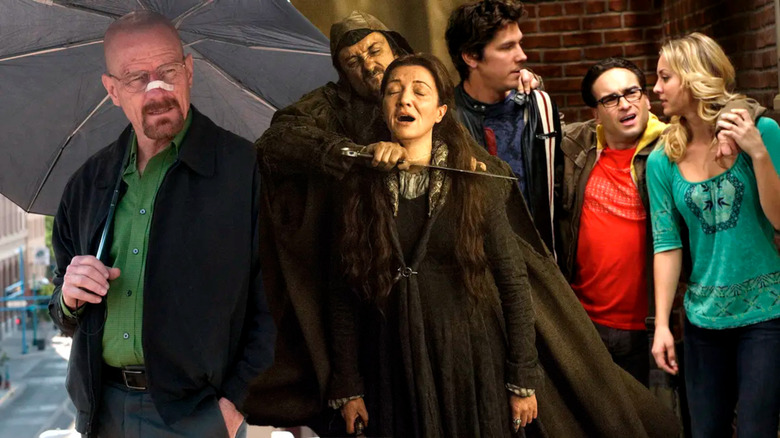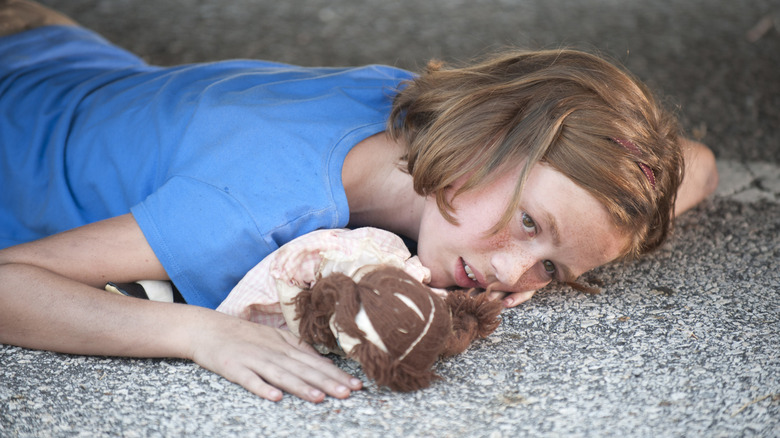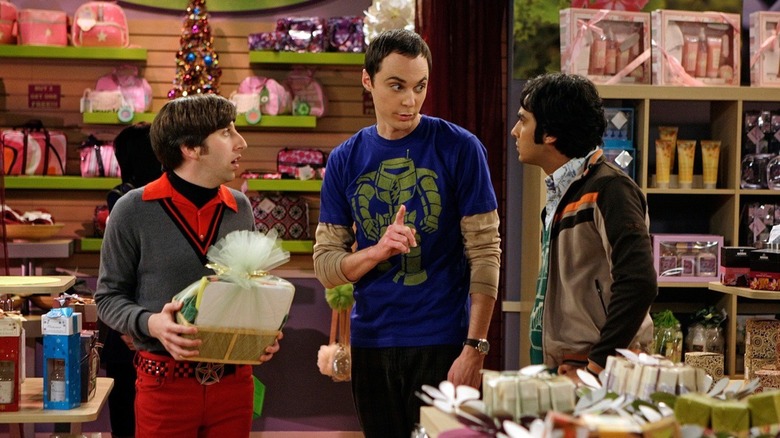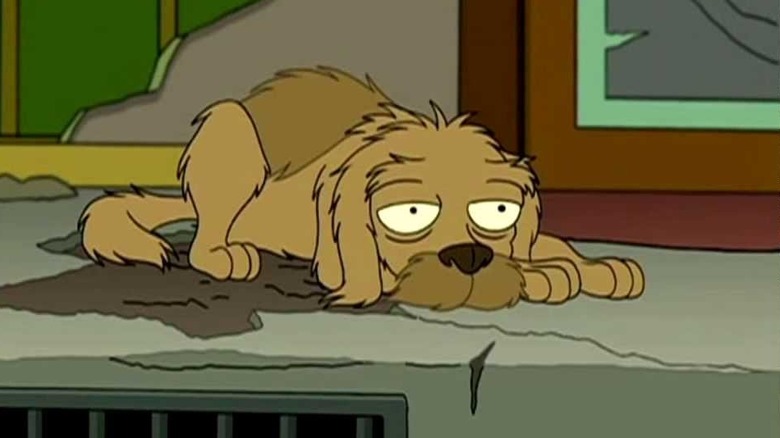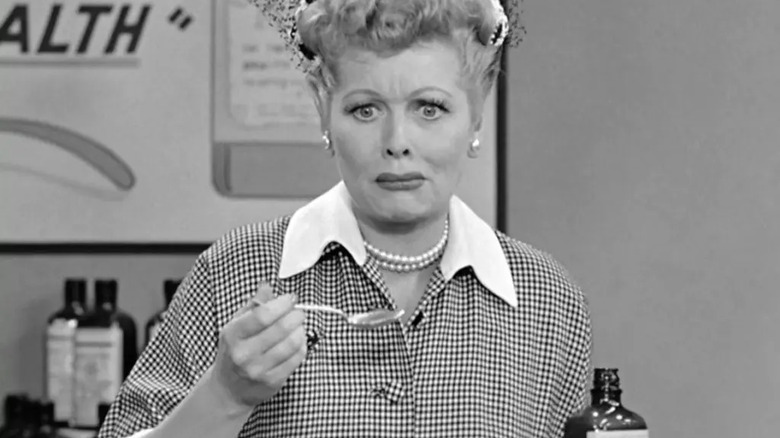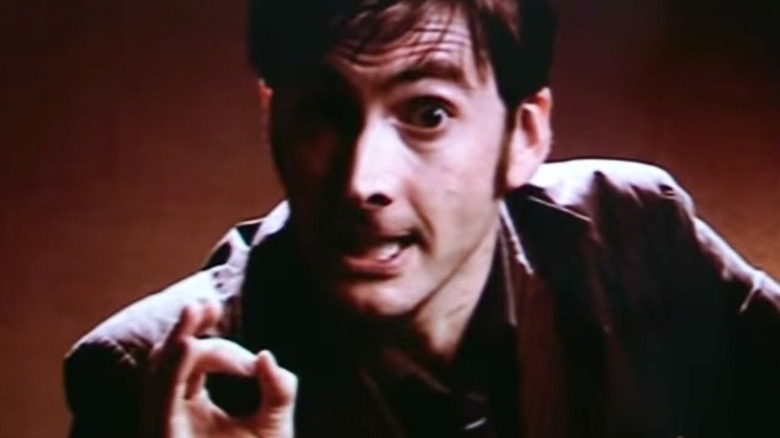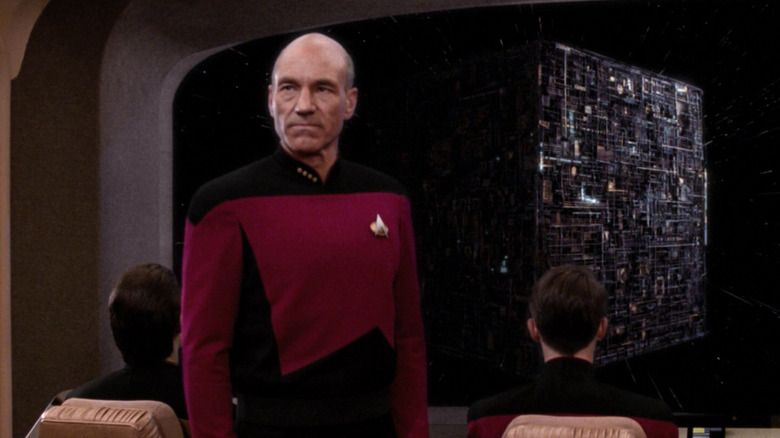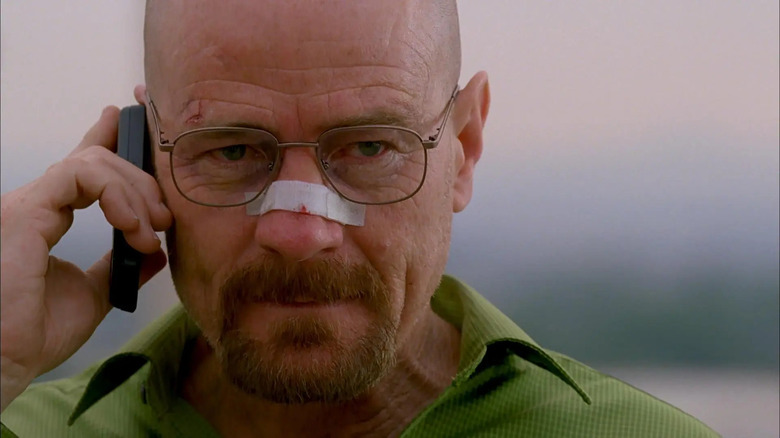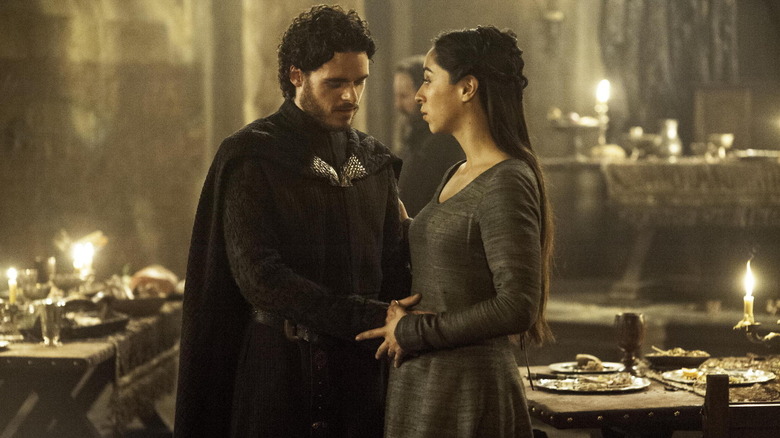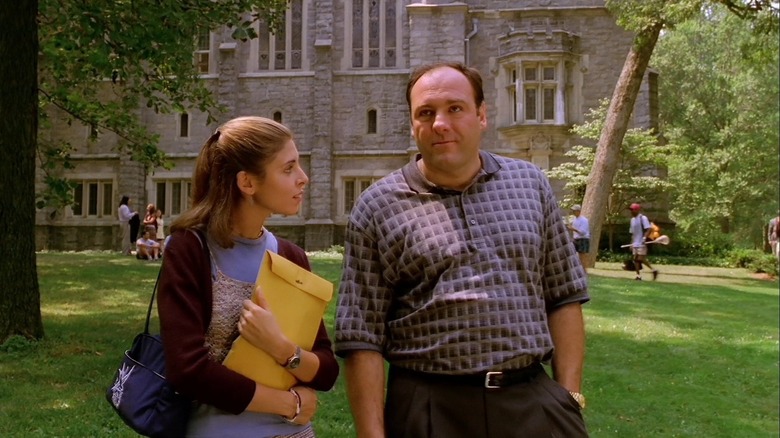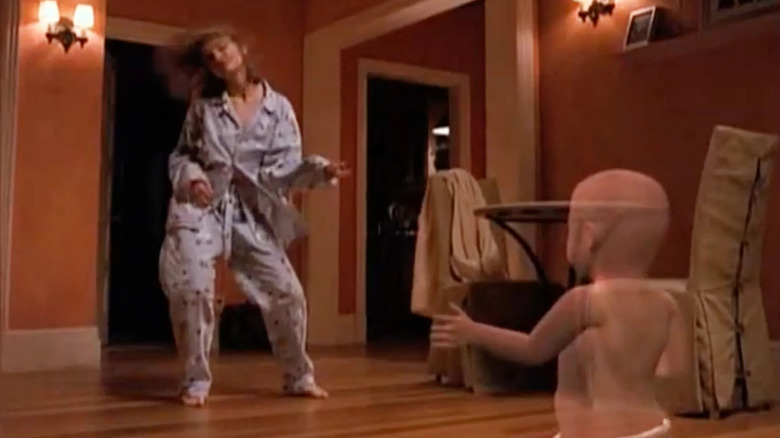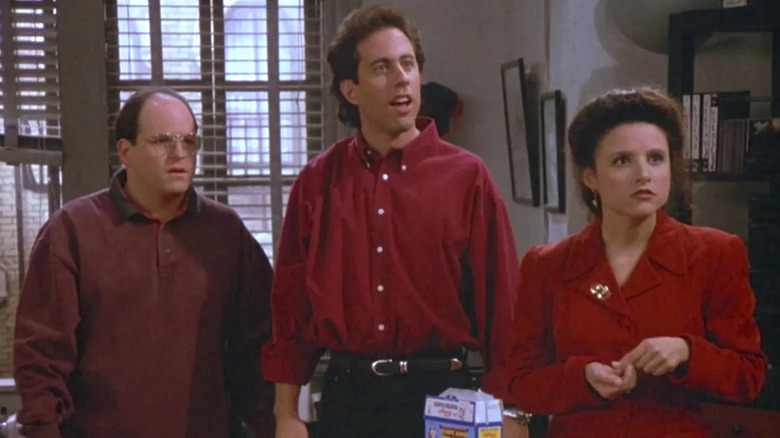The One Episode That Catapulted These Shows To Hit Status
For everyone involved in the production of a new TV show, whether they're in front of the camera or behind the scenes, the ultimate dream is to be part of a hit. Of course, given the vast numbers of shows premiering and airing seemingly every day, the competition for the attention of a limited number of viewers means only so many can achieve that lofty goal. For those select few that find true success, it's usually thanks to either incredible performances, writing, humor, or a combination of all three.
Of course, those aren't the only things that can make a show a hit. Every once in a while, a series can find a sudden boom of success that can all be traced back to a single episode, which often goes on to be considered one of, if not the, best in the show. Below, we'll be taking a look at some of the most popular television series in history to be part of this phenomenon. Some achieved huge boosts to their ratings thanks to a fateful episode, and others simply found themselves more beloved after the fact. Either way, all of these programs owe a lot to one episode in their run.
The Walking Dead, Pretty Much Dead Already
It can be tough for heavily serialized television series to find new viewers in droves, as the longer a show goes on, the greater the time commitment new fans must invest to catch up. Of course, that's not always the case, with the dilemma never seeming to be an issue for "The Walking Dead." Adapted from a comic book series of the same name, the series first aired in the fall of 2010. The show follows former deputy Rick Grimes, who rises to become the leader of a small group of survivors during a zombie apocalypse. The group travels the country looking for a safe place to call home, which eventually leads them to a rural farmhouse after a tragic mishap with Rick's son, Carl.
Fast-forward to the mid-season finale, "Pretty Much Dead Already," and a brewing conflict between Rick and fellow survivor and friend Shane comes to a boiling point, which also winds up solving one of the show's ongoing mysteries. A particularly brutal episode that showed many of the characters pushed to their breaking points, it's both one of the best episodes of "The Walking Dead" over a decade later, and responsible for catapulting the show to hit status. By just the next episode, "Nebraska," the show had gained a million and a half new viewers, and over two million more by the start of Season 3.
The Big Bang Theory, The Bath Item Gift Hypothesis
Set in sunny Southern California, "The Big Bang Theory" followed a friend group led by a pair of genius but socially stunted physicists Leonard and Sheldon, as well as their more gregarious neighbor Penny. Whether you love it or hate it, there's no denying that the 2007 series went down as one of the most popular sitcoms of the 21st century. And with 10 Emmy wins and a total of 55 nominations to its credit, it's got the credentials to back that claim up. Still, a mixed bag of a first season (at least, according to critics) meant the show might never live up to its explosive title. Despite the growing pains, however, the series finally started to come into its own by Season 2, in no small part thanks to a smash hit holiday episode smack dab in the middle of the season, "The Bath Item Gift Hypothesis."
At the heart of the episode is Sheldon finding himself in a conundrum after facing an impending Christmas gift from Penny. In over his head shopping for a woman, he goes overboard and practically buys everything in sight, which still might not match what she's acquired for him. Since its airing, it's been remembered as one of the best holiday sitcom episodes of all time, and is easily among the best of the show. With all the hype around this one, the numbers manage to back up the claim that it catapulted the series to hit status, with the Season 3 premiere debuting to nearly 13 million viewers against Season 2's nine million.
The Simpsons, Jurassic Bark
Cartoonist Matt Groening has given fans more than just "The Simpsons." One of his more noteworthy projects was "Futurama," another animated comedy series similar in tone but wildly different in setting, which followed New York native and millennium transplant Philip J. Fry, who wakes up in the year 3000 after a cryogenic freezing accident.
Fast forward to Season 4, and audiences were treated (or subjected, depending on how you look at it) to "Jurassic Bark." The episode begins with Fry's visit to an excavated pizza place from the 20th century, which he quickly realizes is the site of his old job. Among the rubble, he finds the fossilized remains of his dog Seymour, and embarks on a mission to resurrect his long-dead best friend. An incredible episode with an absolutely heart-wrenching final scene, "Jurassic Bark" isn't just the best episode in the whole series, but also the hardest to revisit.
Just like the show itself, "Jurassic Bark" is a bit of an oddball entry on our list, as it wasn't followed by a particularly noteworthy spike in viewership. What the episode did do, however, was show just how far beyond typical comedy fare the series could get given the chance. And while "Futurama" might have been remembered as an underrated cult hit without the episode, it helped to transform the series from just another solid comedy show to one easily able to stand toe to toe with Groening's best work.
I Love Lucy, Lucy Does a TV Commercial
The oldest pick on our list, and in fact one of the earliest sitcoms to be broadcast, "I Love Lucy" was an undeniable sensation when it was around. With a six-season run spanning eight years, it still ranks among the funniest sitcoms ever made over 70 years after its debut, and helped lay the foundation for everything that would follow. The black and white series follows Lucy Ricardo, an aspiring performer with little in the way of actual talent, whose ambitious dreams seem to be met with more chaos than success. Rounding out the lovable cast are her best friends Fred and Ethel, as well as Lucy's husband Ricky.
While the series as a whole was a recipe for success right from the start, it may not have dominated the airwaves to the same degree without a certain episode during its debut season. Titled "Lucy Does a TV Commercial," the episode saw Lucy vying for a spot on an upcoming commercial, a plan her husband is less than supportive of. What follows is some TV-destroying and alcohol-fueled antics that topped out as the second highest-rated episode of the series. Audiences were forever hooked, and pretty soon episodes of "I Love Lucy" were outperforming presidential inaugurations by viewer count.
Dr. Who, Blink
First airing in 1963, the British television series "Dr. Who" would go on to be wildly successful, airing for over 25 years before eventually being taken off the air in the late '80s. Over a decade and a half later, it was time for the series to make a return to the BBC. With an all-new writing team and a new doctor to boot, the new version did well enough to prove to the network that there was still interest in the franchise among audiences. That said, it would take some time to truly retake its throne as a hit TV show, which all changed with 2007's "Blink."
One of the earliest contributions to "Dr. Who" by series regular Steven Moffat, the episode hardly even has the Doctor in it at all. Instead, it follows the goings on at an abandoned manor populated only by lifeless, stone statues of angels. At least, that's what we're led to believe, before realizing that "Blink" just introduced us to one of the Doctor's all-time greatest antagonists. A time travel mystery that's as intriguing as it is scary, it's not hard to see why the episode remains the greatest of "Dr. Who" to this day. And while it wasn't followed by a particularly significant jump in viewership, "Blink" instead gave modern "Dr. Who" the identity it needed to remain a lasting hit.
Star Trek: The Original Series, The Best of Both Worlds: Part 1
Just a few years after the aforementioned "Dr. Who" hit the airwaves, another sci-fi classic captivated fans of the genre. Airing for just a scant three-season run, "Star Trek: The Original Series" left an undeniable mark on pop culture, and one whose contributions we're still enjoying today. Nearly 20 years after its conclusion, and after a number of feature films, the franchise once again found new life on the small screen with its second live-action iteration, "Star Trek: The Next Generation."
The final series to feature direct involvement from Gene Roddenberry before his passing, the newest version of Trek admittedly got off to a bit of a rough start. Cheap-looking sets, campy storylines, and poorly defined characters all worked against the show, making it feel outdated even at the time. All that would change, however, with the series' first two-part episode, whose first half served as both the Season 3 finale, as well as an epic cliffhanger.
The episode follows an intense standoff with the Borg that leaves Captain Picard not just their prisoner but also their latest assimilation. With First Officer Riker in command and the man we'd known as Picard seemingly lost to the enemy, "The Best of Both Worlds: Part 1" introduced an element of suspense previously unseen in "The Next Generation." Fans were left wondering where the story would go from there, tuning in for not just the continuation of the two-parter, but for the next four seasons, cementing "The Next Generation" as a certified hit.
Breaking Bad, Face Off
It's safe to say that "Breaking Bad," the immensely popular 2008 crime drama from creator Vince Gilligan, has become a veritable icon of modern pop culture. Endlessly quotable, supported by a film and spin-off series, and responsible for redefining and launching the careers of series leads Bryan Cranston and Aaron Paul, respectively, it's hard to find many critics of the 16-time Emmy-winning series. While there are almost no weak episodes in the show's five-season run, one in particular helped to solidify its reputation among the all-time greats.
Capping off the fourth season, the fittingly titled episode "Face Off" served as the explosive conclusion to the dangerous relationship between Walter and drug kingpin Gus Fring. The second highest-rated episode of the series (and the first at the time), the finale was, at least by "Breaking Bad" standards, met with fairly typical ratings, falling just shy of two million viewers. That said, the episode certainly got people talking and helped bring in millions of new viewers to the series by word of mouth, who now had to play catch-up. By the start of Season 5 less than a year later, viewership had climbed by a million strong and had ballooned to over triple that of "Face Off" by the middle of the fifth season.
Though "Breaking Bad" was always destined to be remembered fondly, "Face Off," as well as the incredible final season that followed, combined to transform the series from a modest hit to an outright titan.
Game of Thrones, The Rains of Castamere
A sprawling fantasy epic beloved by millions of viewers, there are few equals to "Game of Thrones." Adapted from a bestselling collection of books by author George R.R. Martin, the television series dumped the lighthearted adventurous tone seen in many similar fantasy works for a gritty, violent, and raunchy take that pushed the envelope for television's limits time and time again. Despite its intense material, "Game of Thrones" managed to win over both faithful fans of Martin's work and newcomers to the series, becoming one of the best television shows of the decade. All that may not have been possible, however, had it not been for "The Rains of Castamere."
The episode, which earned writers David Benioff and D. B. Weiss Emmy nominations, followed the infamous "Red Wedding" between Roslin and Edmure Tully that ends in the bloody slaughter of Robb Stark and his men. While "Game of Thrones" fans may be some of the toughest to shock, the episode did just that, which got viewers everywhere talking, with even former actor on the series Miltos Yerolemou weighing in on the shocking episode. He's since credited the episode with being what truly made the series a hit, saying in a 2021 interview: "Once people watched the 'Red Wedding,' they were like, oh my god. We have no idea what is going on in this show. From that moment on, that's when I had felt it changed, it really changed then. Everyone started writing about it. It became bigger than just a TV show."
The Sopranos, College
Never absent from discussions and rankings of the best television series of all time, "The Sopranos" might just be the biggest hit we're covering. Without the luxury of relying on a pre-existing franchise to piggyback off of, and with some of the cast being unknown at the time, the series had to earn its way to the top. And earn its way it did, with a host of incredible episodes and performances all revolving around Tony Soprano, who lives a double life as both a family man and a surprisingly human New Jersey crime boss.
Over the eight years and six seasons that "The Sopranos" was on the air, there are many moments that remind us why we love the series so much. One episode in particular way back in 1999 during the show's first season was an early sign of what was to come. Titled "College," it saw Tony Soprano leaving his home turf to visit prospective colleges for his daughter Meadow. Along the way, the trip is complicated when he finds snitch-turned-witness-protection-member Fabian Petrulio, who Tony doesn't intend to leave alive.
Demonstrating a marked shift for a character who, until now, had done little to live up to his reputation as a mafioso in the eyes of audiences, the episode still seamlessly followed the delicate tightrope walk between Tony and his family. Though it's not the highest-rated episode of the series, "College" may have just been the most important, hooking audiences everywhere in for what was to come.
Ally McBeal, Cro-Magnon
Half legal drama, half romance, "Ally McBeal" first aired in the summer of '97. It follows the eponymous Allison McBeal trying to navigate her new job at the Boston legal firm "Cage & Fish." Premiering to solid ratings, one episode in particular during the first season helped catapult the quirky series from popular to a proper hit. Titled "Cro-Magnon," the episode is probably best known to most fans today as the one with the dancing baby, and saw McBeal tackling an assault case while her friend runs into relationship challenges. The entire time, of course, McBeal is plagued by seemingly random visions of an unapologetically '90s 3D rendering of a baby wherever she goes.
As anyone old enough to remember will likely tell you, that darn baby was everywhere at the time. And while the graphic itself predated "Ally McBeal" by several years, that didn't seem to matter. See, since the episode's release ran parallel to a growing number of Americans with access to the internet, "Cro-Magnon" captured lightning in a bottle, spawning one of the world's first memes. The episode going viral had undeniable results for the series, with the episode prior to "Cro-Magnon" having less than 9 million viewers, and the one following it over 14 million. They stuck around too, with an episode of "Ally McBeal" never again dipping below 10 million viewers until its final season.
Seinfeld, The Contest
By the late '80s, sitcoms were a well-established pillar of prime time television. Typically, however, the order of the day was your standard formulaic and plot-forward affair. Often dubbed the "show about nothing," "Seinfeld" was a direct rebuke of the average sitcom, and broke the mold in so many ways. Since then, it's been rightfully remembered as one of the greatest television shows of all time, both by human critics and our AI companions. That said, it wasn't a bona-fide hit from the start, or even for the first few seasons, until one episode came along and changed everything.
The 11th episode of "Seinfeld's" fourth season, "The Contest" followed the gang challenging one another to partake in a sordid contest with money on the line. Though the series was known for its edgier stories, the episode still pushed the line even by "Seinfeld" standards, with censors expectedly forbidding certain language from appearing in the episode. The risky play paid off, however, with viewership for "Seinfeld" soon skyrocketing to make it a nationwide hit by the end of the season.
It's not just speculation and statistics that helped us pinpoint "The Contest" as the moment where everything changed for "Seinfeld," however; even series lead Jason Alexander confirmed as much. With a little nudge from the series' newfound time slot directly behind "Friends," as well as a hilarious plotline that's still remembered as the best in the series, it's no wonder the series was, as Alexander put it best, "sailing sweet" from there.
